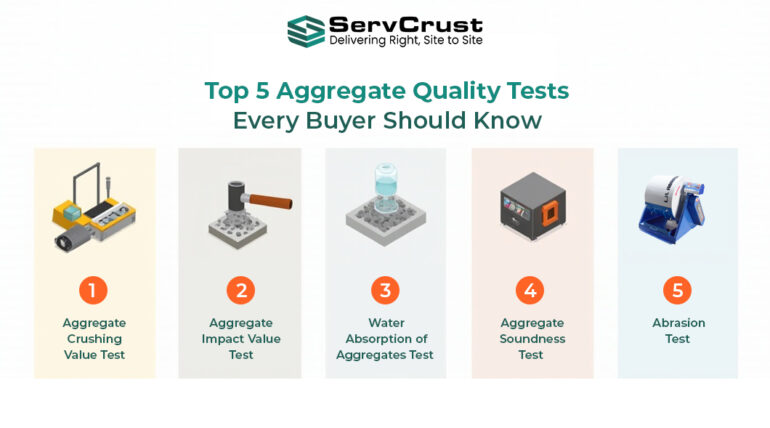
When it comes to construction, the quality of your aggregates can literally make or break your structure. Aggregates form the foundation of concrete and road work, and if they’re not tested properly, your entire project is at risk.
Yet, many suppliers skip key quality checks. Whether due to oversight, lack of equipment, or cost-cutting, these gaps can lead to major issues on-site. In this blog, let’s explore the top 5 aggregate quality test every buyer should know especially the ones often ignored.
Why Aggregate Quality Testing Is Non-Negotiable
Role of Aggregates in Structural Performance
Aggregates give concrete its strength, stability, and resistance to wear. From highways to high-rises, coarse and fine aggregates are the silent strength behind every solid structure.
Consequences of Ignoring Quality Tests
Without proper testing, aggregates can cause cracks, poor bonding, moisture retention, and early failures. Even high-grade cement can’t fix weak or water-absorbing stone.
Who Should Care?
Contractors, site engineers, architects, and even individual home builders must ensure they’re sourcing the quality test aggregates. It saves time, cost, and safety concerns down the line.
1. Aggregate Crushing Value Test (The Strength Check)
This test checks how much pressure aggregates can withstand before they crush. It helps you understand the crushing strength of aggregates, which is vital for structures that bear heavy loads like roads and bridges.
To perform the aggregate crushing value test, aggregates are placed in a compression machine and loaded gradually. The resulting percentage of crushed material indicates its crushing value. Lower the value, stronger the aggregate.
The standard is defined in IS: 2386. For most construction work, values under 30% are acceptable. This test is especially important for base layers and load-bearing concrete.
2. Aggregate Impact Value Test (The Toughness Indicator)
While crushing check static pressure resistance, this test measures the aggregate’s ability to handle sudden shocks.
Why is it important? In areas prone to vibration or traffic like roads or airport runways, the aggregate impact value test is more relevant than the crushing value.
It follows the same IS Code: 2386. Aggregates are hit with a hammer-like weight, and the amount that breaks is recorded. A lower percentage means tougher material.
So, the difference between impact and abrasion tests is that Impact checks shock resistance. Abrasion tests surface wear. Both are needed for high-use surfaces.
3. Water Absorption of Aggregates Test (The Hidden Weakness)
This test reveals how much water the aggregate can absorb. Excess moisture reduces bonding and can delay concrete setting.
water absorption matters in aggregate quality because Porous aggregates soak in water, which changes the water-cement ratio. This leads to weaker concrete, shrinkage cracks, and poor finish.
To perform the water absorption of aggregates test, you soak the stones, weigh them wet and dry, and calculate the percentage difference. Ideal values? Under 2% for most stone aggregates.
Understanding this test can prevent serious quality and durability issues.
4. Aggregate Soundness Test (Weather Resistance)
In humid or rainy areas like Andhra Pradesh and Telangana, this test is essential. It checks the stone’s resistance to weathering especially freezing and melting cycles.
soundness test are performed by Aggregates soaked in a sodium or magnesium sulfate solution and then dried in cycles. The change in weight indicates how resistant the stone is to weather conditions.
It’s part of IS: 2386. If an aggregate disintegrates quickly during the test, it’s not fit for exterior use.
5. Abrasion Test (Durability)
This is one test that even experienced suppliers often ignore. The abrasion test tells you how resistant aggregates are to rubbing, grinding, and wear especially under moving loads.
Used mostly for pavements and floors, this test is done in a machine called the Los Angeles Abrasion Machine. Aggregates tumble with steel balls, and the amount that breaks down is measured.
When should you prioritize this test over crushing or impact? When you’re working on high-traffic surfaces or industrial flooring where surface erosion matters.
Why Suppliers Might Skip These Tests
Some suppliers may not have the testing equipment or may not understand the importance of these tests. Others may skip them to save time or costs, especially when supplying in bulk.
As a buyer, ask for an aggregate test report before placing a large order. It’s your right to know what you’re paying for. Servcrust is a Trusted platform and openly provides this data.
Conclusion
Each one tells you something vital about the material’s strength, durability, or water resistance. Skipping them is risky. Don’t just order aggregates, demand quality. Ask your supplier, “Have these tests been done?” At ServCrust, we deliver tested and certified aggregates to your site within 24 hours. Call us or message us on WhatsApp at 8811881111 to place your order today.
